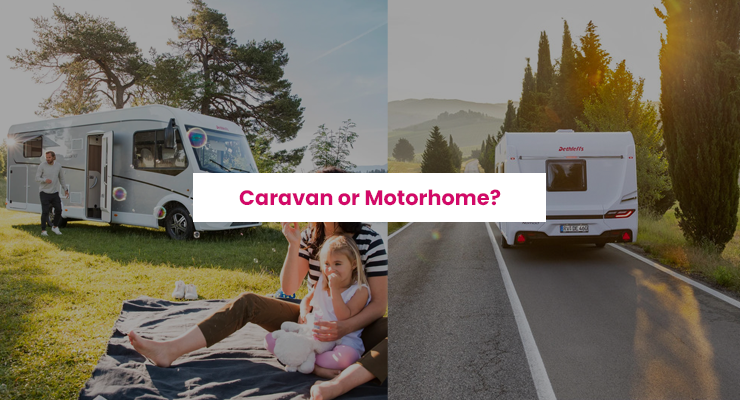If you’re thinking of buying a caravan or motorhome to hit the open road then how do you know which one is right for you? Both caravans and motorhomes have their pros and cons, and it’s important to make the right decision for your needs.
In this blog post, we’ll take a look at the key differences between caravans and motorhomes and cover all of the considerations you should take into account to help you decide which one is best for you.
For the purpose of this article, we’re going to be comparing ‘touring caravans’ vs motorhomes here as apposed to ‘static caravans’ which are usually just sited in one place and very rarely moved.
Jump to
The Difference: Caravan vs Motorhome
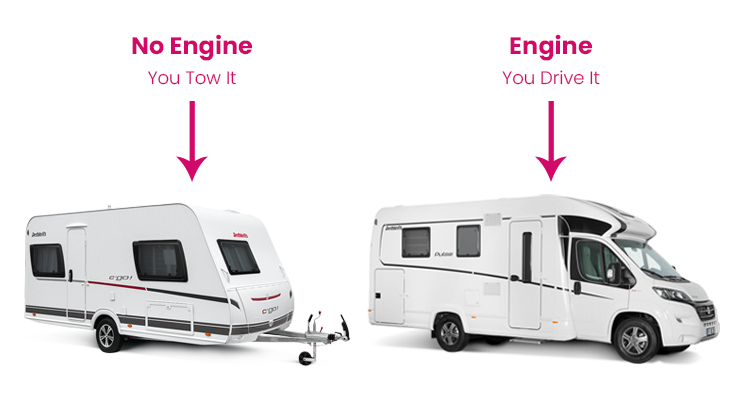
There is a quite clear and obvious distinction between a caravan and motorhome here so I am going to refer to a single line definition for both:
What is a Motorhome? A motorhome is mobile recreational vehicle (RV) which which contains both the engine and living accommodation within one vehicle or unit.
What is a Caravan? A touring caravan is a leisure vehicle equipped for living in during holidays and typically towed by a car.
Aside from the obvious difference, you’ll find that both caravans and motorhomes have a lot in common but below we’re going to break down section by section the things you should consider.
Price & Cost of Ownership
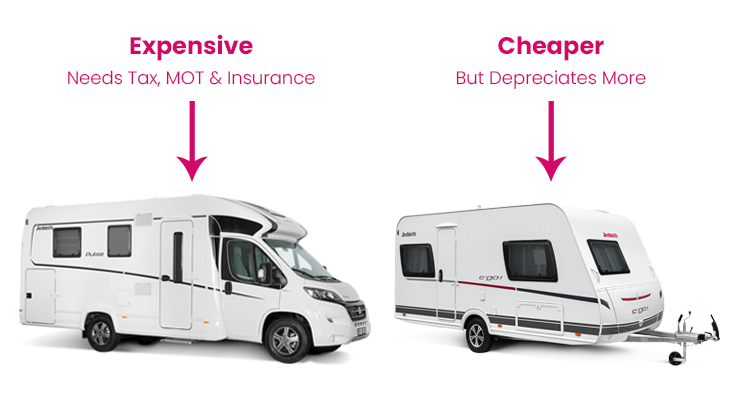
So let’s discuss the purchase price and ownership costs of caravans vs motorhomes.
Purchase Price
This is probably going to be the main driving force of the decision you ultimately make between buying a caravan or a motorhome. The process however is a lot like buying a car. There are lots of variations to choose from with additional extras and even bespoke options and all of these things are factored into the overall purchase price.
Generally motorhomes are a lot more expensive to buy compared to a caravan. The main reason for this is that motorhomes are built onto a road worthy driving vehicles, usually derived from commercial vans like Fiat Ducato’s or Mercedes Sprinters. Because of this, there is a base cost of that vehicle before a motorhome manufacturer even ads in the coach built living accommodation on the rear. To give you some perspective on this, a commercial Fiat Ducato or Mercedes Sprinter van is likely to cost you £30,000+ today and thats just an empty van.
A brand new caravan compared to it’s equivalent motorhome is going to cost much less than a motorhome because it doesn’t need an engine or a cab or the sophisticated suspension and braking technology required for a vehicle to be road-worthy. Essentially a caravan is made up of a simple lightweight chassis with a box like construction from wood, metal and GRP otherwise referred to as fibreglass.
Running Costs – Tax, MOT & Servicing
Caravans don’t require tax or MOT’s and don’t require engine servicing for obvious reasons however a motorhome on the other hand does require all of these things of which tax and MOT is a legal requirement.
The running and maintenance costs are generally a lot higher for a motorhome here because of the yearly requirement for tax and an MOT. As well as this, you need to consider that your engine will also need a yearly or miles based engine service to keep it running in tip top condition and the price of a full service can vary from anything between £100 to £500 if you intend on taking it to a main dealer.
Whilst caravans don’t have engine service requirements there are maintenance costs you should consider to ensure it is safe for towing on the roads. These are things like tyres, the braking and light system on the caravan itself. You need to ensure the tyres are safe, within date and have enough tread on them (a lot like your car tyres) and you need to ensure the side and rear lights are working correctly with your vehicle.
Habitation Checks
One cost both caravans and motorhomes will share is something called a habitation check. This is a yearly service that you don’t have to do by law, but is advisable to ensure the habitation area of your leisure vehicle is safe. A habitation check is conducted by a registered and licensed engineer and they will check whether your gas appliances are safe, your electrical appliances are working properly and whether your vehicle has any water ingress issues through a damp meter test on your walls and floors. The cost is generally the same for both caravans and motorhomes but it is worth keeping in mind.
Caravan Insurance vs Motorhome Insurance
The big factor here is that you are not legally required to have caravan insurance whereas it is a legal required to have insurance for a motorhome that you intend to drive on the road with.
But before we all celebrate a big cost saving win for caravans here, there are some essential reasons why you might want to insure your caravan. For example, if you have an accident on the road that is your fault and you damage your caravan, your car insurance is unlikely to cover any cost of the repairs to the caravan and will only cover your car or towing vehicle. Another reason why you probably should consider getting caravan insurance is because your caravan still has a big risk of getting stolen or damaged either on your driveway or whether you store it at an offsite storage location.
So whilst you are legally bound to have motorhome insurance and it can often look like an added expense compared to caravans, there are some really compelling reasons why you will probably end up buying caravan insurance anyway.
An important thing to note: We found that some caravan and motorhome insurance doesn’t always cover the contents inside and so if that’s important to you then you should consider getting suitable cover for this.
Also with insurance, note the stipulations on travel outside of the UK. Some insurances have time limits on how many days you can spend in European countries and some countries you may not be covered at all.
Which holds value better – Caravan or Motorhome?
This is an interesting question but given the high cost of these leisure vehicles and the significant investment you’ll be making, it’s probably crossed your mind.
According to Leisure Shop Direct, a caravan will depreciate in value at a rate of about 15% per year whereas, according to Camplify, the rate of motorhome depreciation is relatively low, at roughly about 10% a year.
There will however be other factors that contribute to the level of depreciation you might experience on your choice of leisure vehicle such as, the miles you travel in a motorhome or the condition of your caravan. Current demand will also play a big part in the depreciation. As we’ve seen with the rise in demand of caravans and motorhomes due to the Covid 19 pandemic, the new and used market values have risen considerably and so if you purchased before the boom, you might find that your leisure vehicle has actually appreciated in value! 🤯
Driving & Traveling Considerations
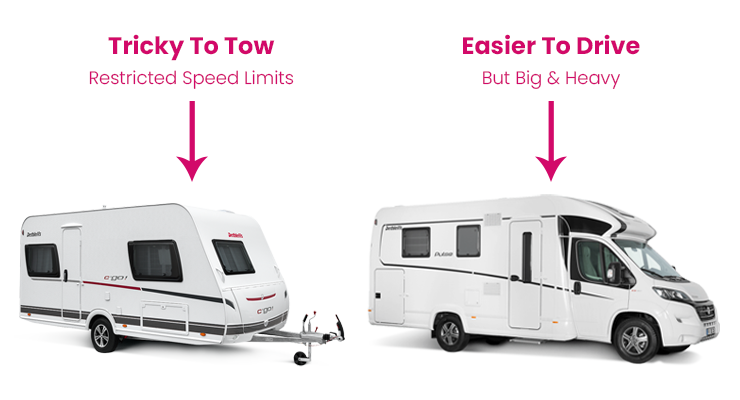
There is a clear distinction between how you will be driving these leisure vehicles. For a start, you’ll be driving one or towing the other however we’re going to cover 4 great points in this section in more detail.
Easier to Drive a Motorhome or Tow a Caravan?
Both towing a caravan or driving a large motorhome provides it’s own challenges however driving a motorhome is generally considered much easier than towing a caravan (although this might really come down to your confidence and ability).
Personally, we find that driving a motorhome that’s maybe the equivalent length and width of a caravan is far easier than actually towing a caravan. The main reason for this is stability and rigidity. By towing a caravan, the length of your towing vehicle plus your caravan can be really long and in addition you’ll have a pivot point where your caravan will hitch onto your tow bar which adds an extra element of consideration. Towing a vehicle makes it more difficult to judge turning into a corner and will also have some extra instability at high speeds or in windy conditions as the caravan will be effected differently and independently from your towing vehicle.
It’s not all plain sailing for driving a motorhome though. A motorhome is much heavier than a caravan and can also be a lot taller too with the extra height of the vehicle chassis. This can make pulling away a little slow and you’ll also be effected in windy conditions.
Something to note: If you tow a caravan your maximum motorway speed is reduced to 60mph and you cannot use the 3rd lane for overtaking whereas with a motorhome under 3,500kg the speed limit or use of the 3rd lane is not effected.
Which is Safer – Motorhome or Caravan?
There’s no real difference in safety when pitched up or parked up in your location however deciding which is safer to drive is probably the best comparison we can make here. Firstly there are on average 11 accidents in the UK per day which involve towing a caravan or trailer. This equates to more than 4,000 accidents on the road every year, however for motorhomes, the number is so low that it is difficult to find an accurate number. Of course, 4,000 accidents per year includes both caravans and other trailers however both essentially are towed by a car or vehicle and so the dangers are the same.
Do you have the correct license?
Anyone who passed their test after 1997 can only drive a 3,500kg vehicle maximum so this would limit the size and weight of motorhome you can drive. This might be a big consideration if you have a larger family and require more space as the bigger the motorhome the larger it will likely be.
You can however drive a heavier vehicle if you take a C1 test which is a 3 step process which includes, medical, a theory test and a practical test on the road.
The laws around towing license for caravans has recently changed. If you passed your car driving test from 1 January 1997, you’re now allowed to tow trailers up to 3,500kg which was a huge increase from the original 750kg. This means you can drive a vehicle up to 3,500kg with a 3,500kg caravan in tow however, whilst these are the maximums you can tow in terms of your license abilities, there will be some limits of the towing capacity of your vehicle. Not all cars can tow 3,500kg in weight and so you should refer to your handbook for clarification on weight limits.
What type of touring will you be doing?
The type of touring and holidaying you’ll be doing will be a big factor in whether you think a caravan or motorhome is more suitable for you.
For example, if you plan on just traveling to a campsite, staying on the campsite for 2 weeks or so and then exploring the area in your car, then a caravan is likely to be the most obvious choice. A caravan will give you more space on your pitch and you’ll have a car to nip out and about in as often as you want without pulling your living accommodation around with you.
If you prefer to travel from place to place and see more of the world faster, then you might decide the motorhome will be the better choice for you. You’ve got more chance of bagging some stunning scenic views from your motorhome window than you have in your caravan.
Something to note: Due to the rise of popularity in caravanning and motor homing, one thing we’ve found is that campsite demand has sky rocketed and having the motorhome and our off-grid capabilities has given us more options for overnight spots not traditionally common with a caravan. For example, we are able to stay overnight in wild camping spots, carparks and pub-stopovers. This has meant we can travel to all the places we want to see without having to book up campsite pitches well in advance. It seems to give us more freedom to travel and chase the sun!
Feature Differences and Chores
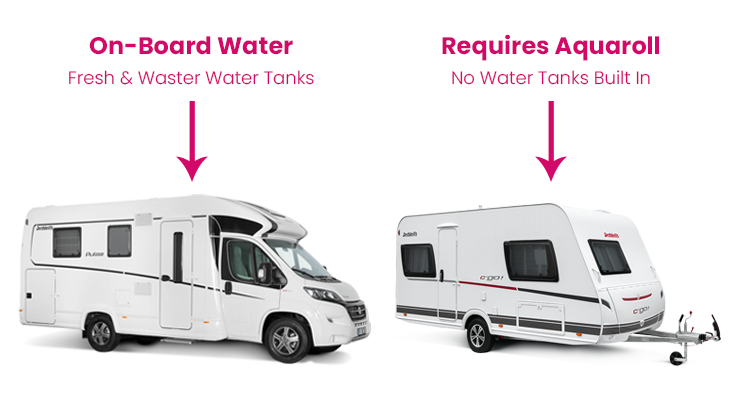
Whether you decide to buy a caravan or a motorhome, theres a few chores you have to get used to doing and a few things to think about. Whilst these certainly shouldn’t be a deal breaker, they both have their differences depending on whether you go for a caravan or a motorhome.
If you intend to be self sufficient inside your caravan or motorhome then you’re going to need fresh water and you’ll also need to be able to cater for the waste water. Both usually have a toilet too in which the toilet cassette will need emptying frequently.
Fresh Water, Waste Water & Toilets
If you intend to be self sufficient inside your caravan or motorhome then you’re going to need fresh water and you’ll also need to be able to get rid of the waste water in the correct way.
On a motorhome most of these things are self contained onboard, what I mean is the fresh water tank and waste water tank are usually strapped underneath the motorhome chassis as a permanent fixture whereas caravans they don’t. You will still need to fill the tank and then empty the waste water in a suitable location but they are usually larger in size and so require less frequent filling for better off grid capabilities. You tend to find the fresh water and waste water tank capacity on motorhomes is around 100-120 litres each as standard.
With a caravan there is usually no permanent fresh or waster water tank therefore you’ll need to purchase and take with you something like a 40 litre Aquaroll and a Wastemaster. You’ll then need to fill up with fresh water at the nearest tap on the campsite you are staying at, then you’ll need to submerge a water pump inside and connect to your caravan so that you can run the taps inside. The same goes for collecting the waste water. You’ll need to locate your Wastemaster underneath the drain point on your caravan and once it’s full, take it to the nearest emptying point.
If you don’t fancy fetching water frequently then the motorhome is the better choice here however on the flip side, if you need to fill up your water tank on the motorhome, you’ll either have to move it to a tap or you’ll need to do multiple visits to fill up the large water tank.
Powering the electrics
Most motorhomes have a good 12v leisure battery set up which can gain a regular charge from something called a split relay where the alternator on the vehicle when running will charge the leisure battery. With caravans whilst you can have a leisure battery, unfortunately it cannot charge from an alternator because it doesn’t have an engine and running alternator which is why more caravan owners rely upon electric hook up at campsites.
Solar panels are a popular option for motorhomes to enable another way of charging leisure batteries without driving or running the engine. You also can find some caravans with solar panels on which will charge a leisure battery in the same way however it’s less common as you don’t tend to see caravans in off grid locations and therefore rely upon the hookup electric at campsites.
Motorhomes are generally set up better to generate 12v power for off grid requirements but if you don’t plan on traveling off grid and will always stick to campsites then a caravan on electric hookup might just be all you need.
Storage Considerations
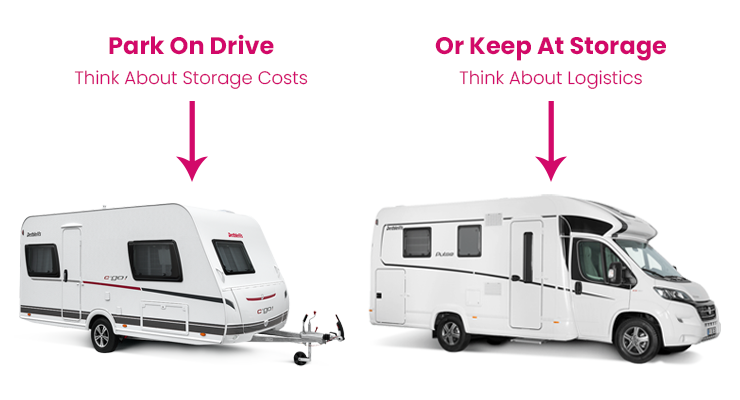
Where will you store your motorhome or caravan? If you are fortunate enough to have enough room to store either on your driveway then there is no advantage for one of the other here however if you require a storage location to store away from your home then you need to make some logistical considerations and cost considerations:
Storage Costs
The demand for motorhome and caravan storage locations has risen dramatically with the increase in popularity for this leisure activity. This rise in demand for motorhomes and caravans has been driven largely by the Covid 19 pandemic which hit us in 2020 and motorhome and caravan manufacturers are struggling to keep up with demand.
Unfortunately this means, as ownership has risen, so too has the demand for offsite storage locations which means it’s harder to find availability and will cost you a lot more than it used too. The average cost today of caravan or motorhome storage is usually around £500 per year depending on the type of storage and location. This is something you should factor into your decision here.
Logistics Challenges with Storage
Firstly you will need to consider in what order you will collect or return your motorhome or caravan to the storage location before and after a trip. Factors that will make this process more or less difficult will be things like, access times. Can you access the storage location 24/7 or is it limited?
Another logistical challenge is. If you have a motorhome at a storage location, can you drive your car there to collect it and then leave your car there? If you don’t leave your car there, you’ll need 2 people to collect your motorhome and one will need to drive the car back home first.
Finally, you need to think about which order you will be loading and unloading all your travel essentials before and after a trip. If you have a motorhome, do you collect it first, take it home then load it before you set off for the open road? And what about the caravan? Perhaps collecting a caravan from the storage yard, driving it home to load taking up lots of space on your road is just an impossible option. In that case you’ll have to load your car instead and then transfer some of the things to your caravan or motorhome when you arrive at the storage location.
These are the logistical challenges you’ll need to consider if storing your motorhome or caravan away from home but at least it gives you some perspective on which leisure vehicle might make more sense for you in this situation.
Pros and Cons: Caravan vs Motorhome
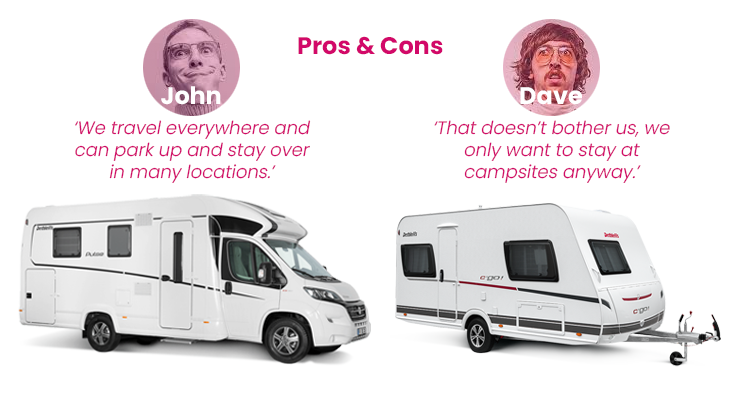
Rather than listing a bunch of difference pro’s and cons’ in this section, I thought I’d just show you why one is better than the other by imagining John and Dave arguing at the campsite justifying why a caravan or motorhome is better. It’s more fun right? 😁
Dave ‘My Caravan is better than a Motorhome’
- Theres more internal space in a caravan without that cab up front
John ‘Yep, fair enough but we don’t need much internal space’ - My caravan is a lot cheaper than a motorhome
John ‘But you still have to have a car and tow-bar to tow it’ - I can use my car to travel to locations near the campsite
John ‘You’ll need to, it’s a faff setting up a caravan on a campsite, you won’t want to move it much’ - There’s less maintenance required on my caravan
John ‘Yes but you still need to maintain tyres, brakes and towing vehicle not to mention 2 separate insurances (if you want to be insured that is)’ - I can put up an awning without needing to take it down every-time we want to drive off in the car
John ‘They do drive-away awnings now Dave. We still have to ensure theirs nothing loose in the motorhome though before we drive.’
John ‘My Motorhome is better than a Caravan’
- It’s quicker to setup and pitch up at campsites
Dave ‘Yep, it takes us a while but I don’t mind’ - We travel more and faster without returning to a campsite we might not like
Dave ‘We can use our car to explore but yes, we can’t go too far away from the campsite’ - We get to do Pubstopovers and find more wild camping spots
Dave ‘Yep, it would be struggle to do that in a caravan’ - My motorhome is far easier to drive than towing a caravan
Dave ‘I don’t mind towing but it can be daunting for some’ - My mrs can drive the motorhome but would never tow a caravan
Dave ‘Yes but I could put my Dorris on a towing training course’ - Our motorhome is completely self contained, we can pull over and pitch up almost anywhere
Dave ‘We can do that in some places within reason but we have to get out of the car and then into the caravan first’ - Motorhomes can hold their value pretty well
Dave ‘Yes but our caravan is much cheaper anyway’ - We don’t need Electric Hookup all the time so we don’t struggle with campsite availability
Dave ‘Good point but if I really wanted to, I could install a solar panel and leisure battery setup on the caravan’
Caravan vs Motorhome Common Questions
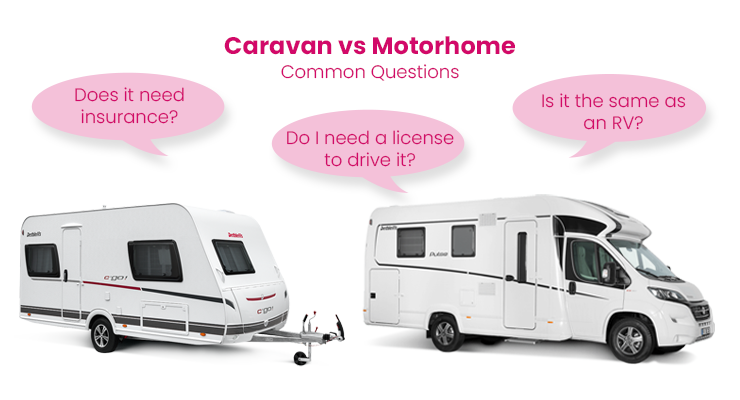
We’ve spent enough times on forums and Facebook groups to come across a lot of common questions people ask about motorhomes and caravans so we have compiled them into this handy list for you.
Motorhome Common Questions
Is a Motorhome the same as an RV?
RV is the term for a Recreational Vehicle, which is a catch-all for campers, motorhomes, and travel trailers. A motorhome is a drivable RV that is either class A, B, or C. While the towable RVs are called travel trailers and fifth wheels. Motorhomes and travel trailers come in different sizes and capacities.
Can you use a motorhome toilet while driving?
It is completely possible to use your motorhome bathroom while driving down the road however, while it may be possible it is illegal in the UK unlike some states in America.
Do you need a special license to drive a motorhome?
Anyone who passed their test after 1997 can only drive a 3,500kg vehicle whereas anyone who passed their test before this date can drive up to a 7,500kg rigid vehicle. If you are limited to 3,500kg on your current license you can take a C1 test which is a 3 step process including a medical, a theory test and a practical test before you can drive anything heavier.
Can I drive a motorhome over 70?
When you reach the grand old age of 70, there’s a requirement to renew your driving licence every 3 years. As long as you meet the minimum eyesight requirement and aren’t prevented from driving for any reason, the standard renewal process should be reasonably straightforward however, you will loose your ability to drive up to 7,500 kg vehicles and will be reduced to only 3,500kg unless you take the additional C1 license test.
Can a motorhome travel in the outside lane on a motorway?
If your motorhome is under 3,500kg total weight then yes it can.
Caravan Common Questions
What is the lifespan of a touring caravan?
According to Justdownsize.com the average lifespan of a caravan is 14 years however, it is not uncommon to see people towing caravans that are much older than this.
Can you wild camp in a caravan?
Whilst technically it is possible, it is highly unusual and frowned upon to pitch up a caravan in a wild spot and stay there for the night. This is more common with motorhomes however.
Do touring caravans hold their value?
A caravan will depreciate in value at a rate of about 15% per year.
How long does it take to hitch a touring caravan?
There are several important steps to take when hitching a touring caravan and so depending on your experience it could take anywhere from 15 minutes up to 1 hour to hitch a caravan safely.
Do you need an MOT for a caravan?
Caravans do not legally require an MOT, with the only consideration being that it’s safe for road use however it is important to do some essential maintenance checks on things like your tyres, brakes, chassis and towing equipment.
Does a caravan need road tax?
No, caravans do not require road tax.
Conclusion
I hope this guide has covered all of the important points and considerations to help you decide whether a caravan or motorhome is the best choice for you.
If you do decide that a motorhome is the best option for you, then you should check out our guide: Tips for Buying a Motorhome or Campervan
Whichever option you decide to go for, from our family to yours we hope you have some incredible experiences on the open road and make many memories.

